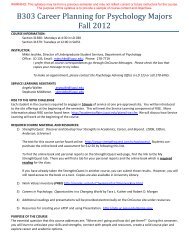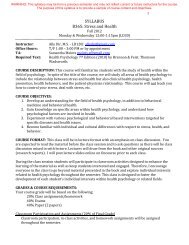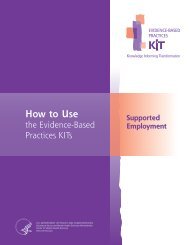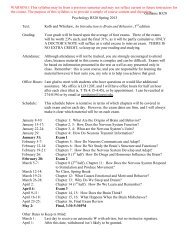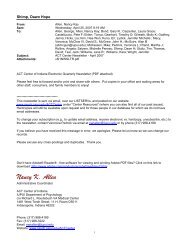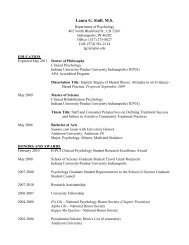Supported Employment: Training Frontline Staff - SAMHSA Store ...
Supported Employment: Training Frontline Staff - SAMHSA Store ...
Supported Employment: Training Frontline Staff - SAMHSA Store ...
You also want an ePaper? Increase the reach of your titles
YUMPU automatically turns print PDFs into web optimized ePapers that Google loves.
First, help Mary become calm by getting her a<br />
Kleenex and a glass of water. Help normalize the<br />
situation by saying that lots of people find the first<br />
day at a new job difficult but that initial problems<br />
are often solved.<br />
Then ask Mary to describe what happened. You’ll<br />
learn that Mary’s boss had asked if Mary could<br />
begin working an hour earlier than had been<br />
originally arranged. Wanting to please her new<br />
boss, Mary said she could begin at the earlier<br />
time. However, on the first morning, Mary found<br />
it difficult to get her children off to school in time<br />
to run for the bus. She then got on the wrong bus<br />
and arrived late to work. During the bus ride, she<br />
became more and more worried about what her<br />
boss would think and began to seriously doubt her<br />
ability to do the job.<br />
After understanding the situation, respond in a way<br />
that is consistent with Mary’s coping strategies. For<br />
example, you may know from previous sessions or<br />
team meetings that Mary can become overwhelmed<br />
with worry, but that she responds well to direct,<br />
practical support.<br />
If Mary still wants to work, she may realize it will be<br />
impossible for her to start at the earlier hour. You<br />
and Mary need to work out a plan that gives her the<br />
confidence to continue in the job.<br />
The plan may include how Mary could talk to her<br />
new boss about her work hours. You and she could<br />
role-play the phone call. To provide support, offer<br />
to stay nearby while Mary makes the call.<br />
When starting a new job, consumers can benefit<br />
from reviewing the transportation plan for getting<br />
to work. You and Mary may want to ride Mary’s bus<br />
route to work together, timing how long the trip<br />
takes and writing out the bus changes on a card that<br />
Mary can carry as a reference.<br />
Finally, congratulate Mary for staying at work<br />
through a hard first day. She reached out to you for<br />
support and assistance in problem solving in just<br />
the right way.<br />
Interventions aimed at the consumer’s<br />
support network<br />
Consumers’ support networks play an important<br />
role in providing effective job supports. As Mary’s<br />
employment specialist, you’ll want to update<br />
team members about what is happening and ask<br />
their views on the situation. Is everyone on the<br />
team supporting Mary’s current work effort For<br />
example, if the psychiatrist expresses concern about<br />
work causing stress, you might describe how others<br />
have achieved greater levels of independence by<br />
learning ways to deal with stressful work situations.<br />
Addressing family concerns and enlisting their<br />
support helps consumers in their work efforts. With<br />
Mary’s permission, call Mary’s mother. What are<br />
her worries You may learn that she believes you<br />
are pushing work on Mary when she believes Mary<br />
is not ready. Setting up a meeting with you, Mary,<br />
and her mother can give Mary a way to clearly<br />
communicate to her mother that she wants to work.<br />
Families can be very supportive, particularly if<br />
someone on the team addresses their concerns and<br />
gives them information about the advantages of SE.<br />
Interventions aimed at the consumer’s<br />
social and physical environment<br />
The third area of support is the social and physical<br />
environment at the workplace. With the consumer’s<br />
permission, you can speak directly with the work<br />
supervisor to problem-solve. Mary may want you<br />
to tell the boss about her struggles with anxiety and<br />
depression, but also to communicate her desire to<br />
succeed at the job.<br />
What is the employer’s assessment of the<br />
consumer’s work performance You may learn that<br />
Mary’s boss had noticed that Mary had been late<br />
the first day but had thought that, generally, the day<br />
had gone very well and found she caught onto the<br />
routine quickly.<br />
<strong>Training</strong> Job Supports <strong>Frontline</strong> and Collaborations <strong>Staff</strong> 3 Module 4



